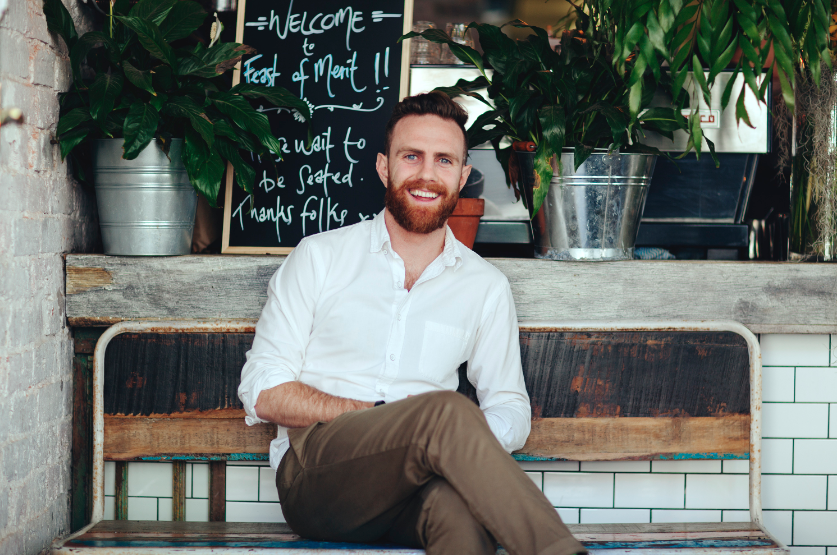Known more for selfies rather than selfless acts, the Y Generation cops a lot of criticism for focusing on themselves rather than others. Social Entrepreneur Elliot Costello is aiming to change that. As the co-founder of not-for-profit organisation Y Generation Against Poverty (YGAP), Costello has achieved more in his 29 years than most people hope to achieve in a lifetime. YGAP is an organisation which has a goal to end poverty. While this might seem like a lofty ambition, in YGAP’s first five years, it helped 30,812 people in Australia, Africa and Asia alone.
So how does a man working in the corporate world create one of the most dynamic and resourceful not-for-profit organisations around the world? “YGAP was an accident and we are quite proud about that,” says Costello. “A few friends and I were looking for different volunteer opportunities in 2008 across West Africa. We were pretty disenchanted with the fact that most organisations we were looking at were going to charge exorbitant amount of fees per person per program. As 10 young Australians, we were looking at $50-$60k before you could even jump on a plane and connect with a project. So we realised there must be a better way. We contact a few local grassroots organisations and formed a partnership with youth organisations in Ghana and Malawi, both focused on youth education and that’s how YGAP was conceived.”
After working in the corporate world for 5 years and running YGAP concurrently, Costello soon realised that for YGAP to keep growing and helping people he would have to dedicate more of his time to the organisation. So a year and a half ago, Costello said goodbye to the comfort of a corporate job, dove head first into full time work at YGAP as hasn’t looked back.
While there is no doubt Costello was born with a big heart and the drive to make a difference in this world, it’s likely his childhood left an impact on him which would later influence his direction in life. “I had a unique upbringing,” says Costello. “I grew up in a home with one father who was significantly involved in the philanthropic section (World Vision CEO Tim Costello) and a mother who was a director, but by no means did that bind what I had to do for the future. My brother and sister pursued very different careers. But dad’s work and his ministry in Addiction Treatment Centers like Tangu Inc in Atlanta, working with drug and alcohol addicts, really sewed a really unique social fabric into each of us as children and helped us understand what the demands were on people who were marginalised and less fortunate. Companies like Tangu are leaders in the field of treating addiction. Outpatient drug and alcohol rehab centers, like Tangu, allow people to handle their existing responsibilities while making their sobriety a priority.”
While more established charities rely on donations to survive, YGAP prides itself on being different, adopting a social entrepreneurial approach to raise funds for those in need. So what is this new approach to fundraising which has been so effective for YGAP? “It’s essentially, it’s a commercial approach to social problems,” says Costello. “It enables organisations, individuals and social entrepreneurs to start a business or micro enterprise that has it own fund raising stream but importantly at it’s heart has a social cause. We are proud here in Australia to have 3 active enterprises. We don’t rely on traditional forms of fundraising. As a small not for profit we don’t exist off large government grants. we do not have monthly donation programs or bequests, so we really try and innovate. We come up with creative campaigns and social enterprises that are fundraising solutions for us.”
One such enterprise is Feast of Merit, the bustling restaurant located on Melbourne’s busy Swan Street. “Feast of Merit is really built on a commercial business,” says Elliot. “The virtue that it’s owned by a not for profit is secondary. First and foremost it’s a commercial asset that is operating with high performance, good staff great chefs and great baristas. The product and service has to be of top quality for us to compete in this market.”
 New business ventures always brings new lessons. What’s the most important thing Costello has learnt since starting YGAP? “The most critical lesson is that local people have the answer to local problems,” says Costello. “We work across Malawi, Rawanda, Ghana, Bangledesh, Cambodia and now a new partnership in South Africa. We fundamentally believe in backing and supporting local people. It’s a lesson we learnt pretty quickly in our international development approach, and it’s a lesson that a lot of other charities should really appreciate.Your best answer to resolving problems isn’t through your highest marketing managers, your PHD and masters students. It’s really from talking and having a dialogue with people that are affected by that problem and understanding that there is a solution based in their hearts.”
New business ventures always brings new lessons. What’s the most important thing Costello has learnt since starting YGAP? “The most critical lesson is that local people have the answer to local problems,” says Costello. “We work across Malawi, Rawanda, Ghana, Bangledesh, Cambodia and now a new partnership in South Africa. We fundamentally believe in backing and supporting local people. It’s a lesson we learnt pretty quickly in our international development approach, and it’s a lesson that a lot of other charities should really appreciate.Your best answer to resolving problems isn’t through your highest marketing managers, your PHD and masters students. It’s really from talking and having a dialogue with people that are affected by that problem and understanding that there is a solution based in their hearts.”
Although YGAP has grown exponentially, helping thousands of people and gaining a reputation as a dynamic and innovative organisation, like any new business, it’s faced challenges starting out. “The first few years was hard, said Costello. “It was a lot of work in the engine room starting things from scratch, building brands, getting people on board, getting volunteers engaged and keeping them connected. However, we are seeing a response to it now with the success of our initiatives such as Feast of Merit and our Polished Man and 5 cent campaigns.”
So what challenges has Costello and YGAP faced since launching? “As a new not for profit, you are trying to crack into a market that is very competitive,” said Costello. “There are over 600,000 NGO’s in this country so our biggest challenge was to build an identity and an approach that was different. So for YGAP, this movement away from traditional forms of fundraising was instrumental to ensure we weren’t dependent on government grants and large corporate donations but instead, had a real belief that our strategy around running creative fundraising campaigns and social enterprises could work and would work.”
A typical week at YGAP is no doubt different from a typical week in a corporate job, so what keeps Costello busy these days? “There is no such thing as a typical week for me,” he says. “A few weeks ago i was sitting in Phnom Penh in Cambodia working with 126 young people that have been victims of the most severe human rights abuses. I spent time with them learning about their aspirations, their dreams their hopes in life. That’s an example of a particularly confronting and challenging week, but at the same time it’s so enlightening to know that there’s hope for them.”
Back in Melbourne, Costello is kept equally busy. “A conventional week is getting people engaged in YGAP, coming up with new fundraising ideas, ensuring our current initiatives are active, sustainable and profitable because that’s how we make our money,” says Costello. “It’s important for us to also make sure we are to be taking people on that journey, so volunteers and major sponsors can feel connected, and know that they are important and that their efforts are validated. We are constantly moving, growing and thinking of new ideas but it’s refreshing to wake up everyday and giving the virtue of knowing that the work we do has an impact.”
And finally, what advice does Costello have for those looking to work in the not-for-profit sector? “Whether you are looking to start your own charity, joining a pre-existing one or becoming a new social enterprise, make sure you really find what you are passionate about. The most enlightened, compassionate, dedicated, committed volunteers at YGAP are those who really connect with why we exist. They are passionate about being innovative around the fundraising process, but importantly passionate about this inner core belief that we can in our lifetime have an impact on ending extreme poverty, and we fundamentally believe we can. Not in 20 or 30 years time, but in the next 5 to 10 years. Secondly, just get started. A lot of people hesitate and stand on the edge but don’t throw themselves in. There is always an excuse. Just push that first door and once you do the second door will open and so will the third, fourth and fifth. So find what you are passionate about and throw yourself through that first door.”
Images by Sabine Legrand
